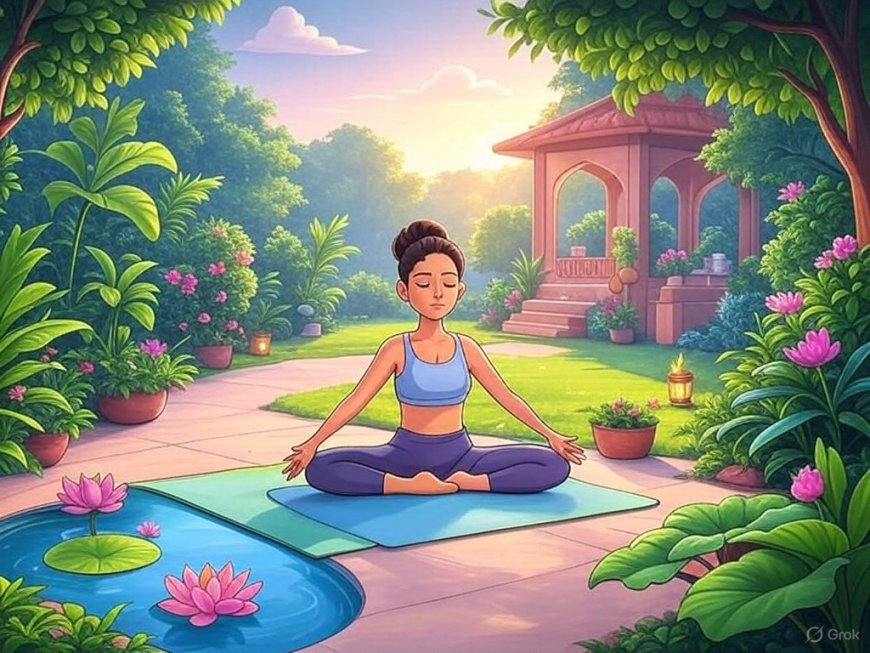India’s Top Wellness Trends for 2025: What Health Experts Want You to Know
Discover the top wellness trends shaping India in 2025, from personalized health to Ayurvedic AI tools and digital mental wellness platforms. Expert insights and science-backed resources included.

Wellness Trends in India 2025: What Experts Say You Should Watch
The wellness industry in India is evolving rapidly, fueled by rising health consciousness, post-pandemic lifestyle shifts, and an increasing interest in holistic well-being. As we move deeper into 2025, the definition of "wellness" has expanded far beyond green juices and morning yoga. It now includes tech-driven health solutions, mental wellness platforms, personalized nutrition, and a revival of ancient Indian healing systems.
This article dives into the most important wellness trends shaping India in 2025, backed by expert insights and scientific research. Whether you're a wellness enthusiast, entrepreneur, or simply looking to lead a healthier life, here’s what you need to keep your eye on this year.
1. Personalized Wellness: DNA-Based Health Solutions Take the Lead
The era of one-size-fits-all health advice is fading. Companies in India are offering DNA-based nutrition, fitness, and lifestyle plans that use genetic insights to optimize wellness outcomes.
Expert Insight:
Dr. Priya Menon, a clinical geneticist at MedGenome, explains, “We now understand that genes influence how we metabolize food, respond to exercise, and even how we sleep. Personalized wellness plans rooted in genetics are transforming preventive healthcare.”
Recommended Resource:
Learn how companies like MapmyGenome are offering accessible, science-backed DNA testing kits tailored to Indian populations.
2. Mental Wellness is Going Mainstream—and Digital
Mental health in India is no longer a taboo topic. Digital mental wellness platforms, therapy apps, and AI-driven emotional support tools are rising in popularity, especially among Gen Z and millennials.
Scientific Validation:
A 2024 report from the Lancet Regional Health – Southeast Asia highlights a 40% rise in digital mental health consultations in India between 2022 and 2024, with anxiety and burnout being top concerns.
Trusted Platforms:
-
Wysa – an AI-powered emotional wellness app developed with clinical psychologists
-
YourDOST – connects users to mental health professionals in real-time
3. Ayurveda 2.0: The Rise of Tech-Enabled Traditional Medicine
Ayurveda is getting a modern facelift. Tech-powered diagnostic tools, AI-driven dosha analysis, and personalized herbal formulations are making this ancient system more accessible and evidence-based.
Expert Insight:
Dr. Rishabh Rawal, founder of an Ayurveda tech startup in Bengaluru, says: “Ayurveda’s principles haven’t changed—but how we apply them has. With digital analysis, we’re removing the guesswork.”
Noteworthy Developments:
-
NirogStreet – a tech platform connecting users to verified Ayurvedic doctors
-
Jiva Ayurveda – offers teleconsultation and custom prescriptions delivered to your doorstep
4. Clean Beauty and Ayurvedic Skincare Dominate the Beauty Industry
Indian consumers are increasingly turning toward clean beauty solutions—products free from sulfates, parabens, and synthetic fragrances. Ayurvedic skincare brands offering transparency, sustainability, and performance are booming.
Market Stats:
According to Statista, the Ayurvedic beauty market in India is expected to surpass ₹71 billion by the end of 2025.
Brands to Watch:
-
Forest Essentials – luxurious Ayurveda-based skincare with global acclaim
-
Kama Ayurveda – blends authentic Ayurvedic formulations with modern sensibilities
5. Longevity and Biohacking Enter Indian Wellness Conversations
The global obsession with longevity and biological age reversal has reached Indian shores. Cold therapy, red light therapy, nootropic stacks, and gut microbiome testing are being adopted in elite wellness clinics and among tech-savvy health consumers.
Expert Insight:
Dr. Rohit Singh, wellness consultant and founder of an anti-aging clinic in Delhi, remarks: “Biohacking isn’t just about gadgets—it’s about using science to improve healthspan, not just lifespan.”
Explore Further:
Check out Quantified Life India—a hub for longevity diagnostics and biohacking guidance tailored to Indian users.
6. Nutrition Gets Smarter: Focus on Gut Health and Probiotics
The Indian wellness market is seeing an increased focus on gut microbiome health, plant-based diets, and smart supplements. Home-grown brands are crafting probiotic-rich foods, fermented drinks, and adaptogenic blends for digestive and immune wellness.
Scientific Backing:
The Indian Journal of Medical Research notes a growing body of evidence linking gut health to immunity, mood, and metabolic disease prevention.
Trusted Brands:
-
Wellbeing Nutrition – offers targeted prebiotics, postbiotics, and adaptogens
-
Kapiva – known for Ayurvedic health shots and digestive care products
7. Holistic Fitness: Combining Strength, Flexibility, and Mindfulness
Fitness is no longer just about burning calories. In 2025, Indians are increasingly choosing fitness practices that blend mindfulness, mobility, and strength training. Modalities like yoga fusion, animal flow, calisthenics, and mindful strength training are gaining traction.
Expert Voices:
Fitness coach Swati Sharma shares, “People are looking for mental clarity as much as physical gains. Workouts now need to be functional and rejuvenating.”
Trending Studios:
-
SARVA Yoga – offers app-based personalized yoga routines
-
Cure.fit – includes mental fitness, nutrition coaching, and strength training under one umbrella
Conclusion: A Holistic Future Rooted in Tradition and Technology
Wellness in India in 2025 is a story of integration—where ancient Indian wisdom meets cutting-edge global science. From personalized genetic wellness to Ayurvedic AI tools and digital mental health support, the future is as inclusive and accessible as it is exciting.
Whether you’re trying to improve sleep, reduce stress, build resilience, or simply live better, these trends provide actionable paths grounded in both heritage and innovation.
What's Your Reaction?
 Like
0
Like
0
 Dislike
0
Dislike
0
 Love
0
Love
0
 Funny
0
Funny
0
 Angry
0
Angry
0
 Sad
0
Sad
0
 Wow
0
Wow
0



















































